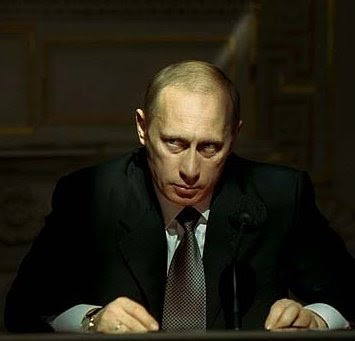What do Vladimir Putin and Napoleon Bonaparte Have in Common besides Being Short?

Now is the time for an official US policy of assassination. It would save countless lives.
This is the Must-Read editorial of the day.
The farther Russia’s tanks roll into Georgia, the more the world is beginning to see the reality of Vladimir Putin’s Napoleonic ambitions. Having consolidated his authoritarian transition as Prime Minister with a figurehead President, Mr. Putin is now pushing to reassert Russian dominance in Eurasia. Ukraine is in his sights, and even the Baltic states could be threatened if he’s allowed to get away with it. The West needs to draw a line at Georgia.
No matter who fired the first shot last week in the breakaway Georgian region of South Ossetia, Moscow is using the separatist issue as an excuse to demolish Georgia’s military and, if possible, depose its democratically elected government. Russian forces moved ever deeper into Georgia proper Monday. They launched a second front in the west from another breakaway province, Abkhazia, and took the central city of Gori, which lies 40 miles from the Georgian capital of Tbilisi. These moves slice the country in half and isolate its ports, most of which Russia has bombed or blockaded. Moscow dismissed a cease-fire drawn up by European nations and signed by Georgia.
Russian bombers have also hit residential and industrial areas, making a mockery of Moscow’s charge that Georgia is the party indiscriminately killing civilians. Russian claims of Georgian ethnic cleansing now look like well-rehearsed propaganda lines to justify a well-prepared invasion. Thousands of soldiers and hundreds of tanks, ships and warplanes were waiting for Mr. Putin’s command.
While the rape of Chechnya was brutal, this is the most brazen act of Mr. Putin’s reign, the first military offensive outside Russia’s borders since Soviet rule ended. Yet it also fits a pattern of other threats and affronts to Russia’s neighbors: turning off the oil or natural-gas taps to Ukraine, Belarus, Georgia, and even to NATO-member Lithuania; launching a cyberassault on Estonia; opposing two antimissile sites in NATO members in Eastern Europe that couldn’t begin to neutralize Russia’s offensive capabilities.
Our emphasis on NATO here is no coincidence. The Georgia invasion is a direct slap at the Western alliance. Tbilisi, like Kiev, has been pushing for NATO membership. Mr. Putin decided to act while some alliance members, led by Germany, dallied over their applications. Georgia was first. Ukraine, which has been pushing Russia to move its Black Sea fleet’s headquarters out of the Crimea, could be next.
The alliance needs to respond forcefully, and it can start today. NATO officials have granted Russia a special meeting before deciding what to do about Georgia — though we don’t recall Russia briefing NATO about its plans in the Caucasus. The meeting is an opportunity to relay to Moscow that Georgian and Ukrainian membership is back on the table and that the alliance is considering all options for Georgia, from a humanitarian airlift to military aid, if Russia doesn’t withdraw immediately.
Mr. Putin is betting that the West needs him for oil and deterring Iran’s nuclear ambitions more than he needs the West. He’s wrong — not least since his “cooperation” on Iran consists of helping Tehran stall for time and selling the mullahs advanced antiaircraft missiles. Russia also needs the West’s capital and especially its expertise in developing its oil and gas fields at least as much as the West needs Russian energy supplies.
The U.S. and Europe need to make all of that clear. Forcing Russia to veto a strong condemnation of its own actions at the U.N. Security Council would be one way to turn the pressure up. And speaking of pressure, where are all the peace protesters during this war? They can’t all be in China.
As for the U.S., this is perhaps the last chance for President Bush to salvage any kind of positive legacy toward Russia, amid what is a useful record elsewhere in Eurasia. While Mr. Bush has championed the region’s fledgling democracies, he and Secretary of State Condoleezza Rice badly misjudged Mr. Putin. Now would be a good moment for Mr. Bush to publicly acknowledge his misjudgment and rally the West’s response.
John McCain had the Russian leader pegged better, which speaks well of his foreign-policy instincts. The Republican Presidential candidate has long said that Russia should be booted from the G-8 and yesterday he outlined a forceful Western strategy on Russia that stops short of military action. Barack Obama has in the past indicated support for the Georgia and Ukraine NATO bids, but the Democratic candidate has yet to explain in any detail how he would respond to the current conflict.
There’s one other way the U.S. could hit Russia where it hurts: by strengthening the dollar. The greenback’s weakness has contributed greatly to the record oil prices that have in turn made Russia flush with petrodollars and fueled Mr. Putin’s expansionist ambitions. Crude prices continued to fall yesterday, below $115 a barrel, and further deflating that bubble would do more to sober up an oil-drunk Kremlin than would any kind of economic sanctions.
* * *
Vladimir Putin’s Russia isn’t the former Soviet Union, bent on ideological confrontation around the world. But it is a Bonapartist power intent on dominating its neighbors and restoring its clout on the world stage. Unless Russians see that there are costs for their Napoleon’s expansionism, Georgia isn’t likely to be his last stop.